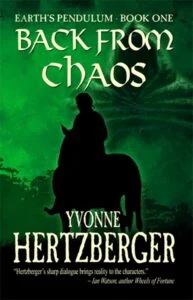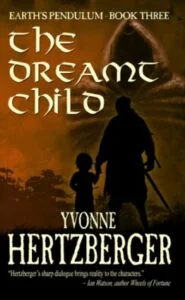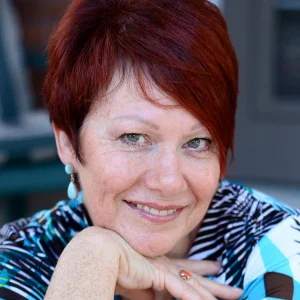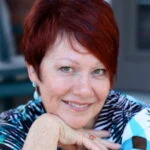Freedom to write in the genre of your choice, and to swap and to blend genres, is one of the many advantages of being an indie author. You can write what you want to write, and worry about the genre later – and even invent one of your own, if your work doesn't neatly fit into an existing trade press category. Canadian self-published novelist Yvonne Hertzberger, setting out to write fantasy, describes how she realised only after publication that she'd fallen under the spell of magic or magical realism, and discovered her true niche.
 Until just over a year ago, when I published the final volume in my Earth’s Pendulum trilogy I had not heard of magic realism, or as some call it, magical realism. Imagine my surprise when a reviewer, an author who writes mainly magic realism suggested this was what I had written. Until then I had listed my books a fantasy, but been unhappy with the limitations of that category. My books have no mythical or magical creatures, no great spells, and the world I created is a modified version of early medieval. Readers looking for such books with spells and dragons would not be drawn to mine.
Until just over a year ago, when I published the final volume in my Earth’s Pendulum trilogy I had not heard of magic realism, or as some call it, magical realism. Imagine my surprise when a reviewer, an author who writes mainly magic realism suggested this was what I had written. Until then I had listed my books a fantasy, but been unhappy with the limitations of that category. My books have no mythical or magical creatures, no great spells, and the world I created is a modified version of early medieval. Readers looking for such books with spells and dragons would not be drawn to mine.
This revelation by the reviewer soon had me digging into what magic realism is and isn’t. There is a wide range of opinions, some suggesting that it may not be fiction, others disagreeing and saying it can, but I came across one definition which I liked. Even better, it fits how I see my work. For those who agree fiction can be included I think it covers things concisely.
What is Magical Realism?
“Magic realism differs from fantasy in that the magical element within the story is an integral part of the characters' daily lives. It doesn't pop in and out of the plot, but is integrated in the fabric of the story.” (found on the Riffle site with no attribution)
In the meantime I have read indie books in that genre and found them to be well crafted and engaging. What’s more, my reading confirmed that I had found my niche. The skeleton for my current WIP came to me in a dream. While I need to expand and sculpt it into a comprehensible story, I took the dream as confirmation that I was on the right track. You see, I rarely remember my dreams, and when I do they are usually nightmares.
While magic realism emerged in literature in the 1950s, it is still a relatively obscure genre, known primarily by those already immersed in it either via the art world or because they belong to a group that seek it out or write it. The designation “Magic Realism” migrated from the fine art world where it had its origins in the 1920s.
Book Marketing Challenge Niches
 For me, the result is that, even after discovering my true genre, I still have difficulty finding readers. While I have added magic realism to my categories where I can, many sites still do not list it as a option, even in the drop-own lists that allow us to refine our keywords. Worse, in many cases fantasy is not listed on its own but is combined with science-fiction, which is even further removed from what I do.
For me, the result is that, even after discovering my true genre, I still have difficulty finding readers. While I have added magic realism to my categories where I can, many sites still do not list it as a option, even in the drop-own lists that allow us to refine our keywords. Worse, in many cases fantasy is not listed on its own but is combined with science-fiction, which is even further removed from what I do.
I think you can begin to see my frustration. To confound things even more, many who do read my trilogy suggest it also fits historical fiction (probably due to the setting), historical romance (it does include a love story), and, of course, fantasy (because it takes place in a society that does not exist). Originally I expected that my work would appeal mostly to women. I was pleased to learn that is the case. I have had male reviewers who love my work.
ALLi & The Indie Author's Quest
Like most authors I am on a constant quest for ways to find and connect with readers and other authors. Like many, I have found that quest to be challenging. I came upon ALLi less than a month ago and have lurked around to see what I can learn here. What I see here are two things I hope will move me forward on my quest. The first is an organization dedicated to helping indie authors with expert support and advice. The other is a Facebook group inhabited by serious writers and authors willing to assist each other with suggestions and information. Will this path help me find new readers? If not, I hope it will at least help me learn what I need to know to expand my circles in the right directions.
OVER TO YOU
- Did you set out to write in a particular genre, or did the genre emerge as you wrote the book, as in Yvonne's case?
- Does your chosen genre create marketing challenges?
- Join the conversation via the comments box!
EASY TWEET
#Magicalrealism and the challenge of book marketing by #selfpub author @YHERTZBE for #AuthorALLi Share on X







I’ll admit the first time I ever heard of magical realism was when I submitted my first short story to my Intro. to Fiction class, which was about three years ago. Essentially, the story was about a girl named Henrietta who wanted her mom to accept her for who she is, only to realize that her mom isn’t who she thought she was. I’ll admit, it wasn’t the best story that I ever created, but it did unintentionally get me introduced to the genre. Ever since then I have been writing magical realism stories, even when my Intermediate Fiction professor didn’t want me to. As a consequence, I’ve been having trouble finding journals and websites that accept my work. Even Facebook and Deviantart are starting to become out of the question. Wattpad and Amazon are two possibilities, but it depends on whether or not I’m lucky to find a good cover artist. I don’t know if you could offer me any advice on such a topic(s), but I’ll consider anything that you could give me. I’m glad you published this article by the way. It brings encouragement to us magical realist writers. 🙂
I seem to be in the same boat filled with talking jackals and cats.
The jackal not being sure if I write fantasy, but cat positive I don’t do science fiction.
So the cat and jackal turn to my readers.
Hi guys, I’m new to this world, in the process of publishing my first book with Create Space. I got attracted to “Magical Realism” category, but not sure if this one is right for me. My book is five short stories about a man who has a magical gift, and what happens when he encounters different characters with other gifts. It’s psychological, folk tale-ish, or paraloles maybe. I’ll keep digging. Thank you for talking about these issues
Just to add that I’ve checked again about that newish Magical Realism BISAC Code, and I’m glad to see Amazon has started offering it now, which is helpful. Also, I meant to mention above the name of another amazing novel whose author referred to it as magical realism, i.e. Ray Bradbury’s “Something Wicked This Way Comes”: “The seller of lightning rods arrived just ahead of the storm”…
Oooh, yes. That’s a good one. And thanks for the tip re. Amazon. I didn’t know that. I sent them a suggestion to include it a while back. maybe they actually listened. 🙂
Read your work, excellent stuff.
Thank you for commenting, Rosalind. Certainly magical thinking can lend another dimension to our writing. Not the same as magic Realism but but could show similarities in how the story plays out.
Interesting piece, Yvonne. And thanks to Dan Holloway and Debbie Young for mentioning me here above. I’m looking forward to reading Debbie’s “Quick Change”; and I can eagerly recommend Dan’s “Songs from the Other Side of the Wall”. Following a heads-up from the vigilant Joanna Penn, I emailed Amazon a couple of months back, to bid them chop-chop and start using BISAC’s recently-introduced “FIC061000 Magical Realism” code, since I’d prefer to substitute this as a second category (after Literary Fiction) instead of “FIC009070 Fantasy / Dark Fantasy”. They emailed back saying they were indeed planning to do so. Not sure if they have yet, but soon enough, I should think. May our realities be ever magical!
Rohan, it’s an interesting world we live in in writing. We keep defining and redefining what we do as we grow and learn.
I had the same thing happen to my debut novel, which I classified as contemporary fantasy, but which more than one reviewer has called magical realism and, in one case, slipstream. I continue to characterize it as contemporary fantasy for the most part, mainly because that’s the genre with which most readers are familiar, but will also check off magical realism when it’s available.
I’m open to whatever anyone wants to call it so long as they read it, enjoy it, and recommend it to someone else.
Thanks, Michael. So it seems you find yourself in much the same dilemma of labeling yourself as I do. Like you, I don’t care as long as people read and like my work.
Related to this. Magical thinking is an aspect of psychological dysfunction not necessarily involving mental health problems. This lends another dimension (or area of possibility) in novel writing.
Thank you, Julie. I think, perhaps, that when we write from the heart, rather than according to what we have been taught or exposed to we can come across some wonderful surprises. Maybe that’s also part of the magic.
I seem to write magical realism, where magical things happen to the characters in there daily lives. It seemed to find me, esp writing for children. I think my dark magical romance series that I am working now could be that, because an object in the character’s life makes magic happen around them in their normal life. I have only found the label of fantasy or paranormal to describe it.
Great post, Yvonne! I had something similar happen to me when I published my first flash fiction collection, “Quick Change”. One of the reviewers commented “many stories stand out thanks to Young’s use of magical realism (more, please!)” I thought I was just whimsical or quirky!
Dare I confess, I had to look it up to make sure I knew what it meant!
I then realised that I’d enjoyed reading a lot of magical realism stories (including Rohan Quine’s “Imagination Thief”, mentioned above) without having articulating the genre.
That’s possibly another reason why it’s challenging to market it – it’s not necessarily a label that we’d look for in a library or bookshop. But maybe in future it will become better known, and we’ll have the satisfaction of feeling like we were trailblazers. Ever the optimist! 🙂
Thank you, Debbie. Si I see that I am not alone in this. Maybe we will spread the word some, now. 🙂
Lovely to hear from another writer of magic realism. There are a few of us knocking around (Rohan Quine and Simon Paul Wilson are the outstanding indie examples that spring to mind). It’s strange to think of this as a niche genre – two of the truly towering figures of twentieth century literature, Gabriel Garcia Marquez and Haruki Murakami, wrote/write magic realism, and many of cinema’s finest moments are magic realism, from the works of Satyajit Ray to The Bicycle Thieves and The Spirit of the Beehive. Where a genre description is lacking in a marketplace, I wonder if the answer is to position your books in the right company – to seek out the fans of other writers rather than of a genre (especially one as diverse and complicated as magic realism). For about my first year of self-publishing, through 2009, I did pretty much nothing but position myself alongside Murakami – and for a work of magic realism it worked remarkably well.
Thank you, Dan. It’s good to find another here who enjoys M
agic Realism. I don’t think I can compare to those legends, though. lol